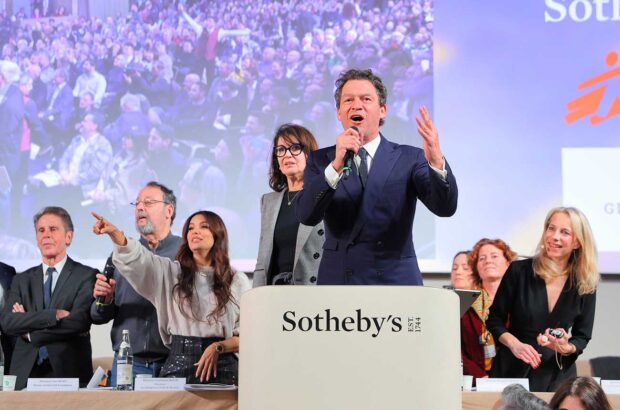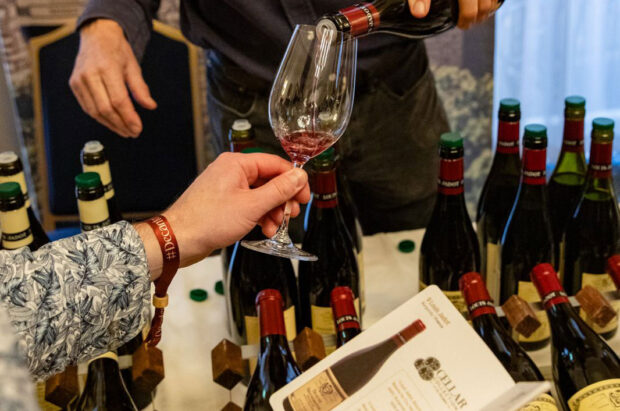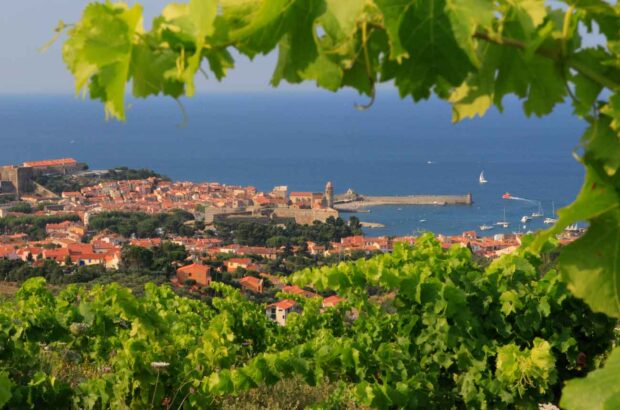Ambrogio Folonari has witnessed at first hand the pros and cons of being part of a family business. MICHELE SHAH meets a man with strong beliefs about family, and Italy's future in wine.
‘Patience, determination and consistency’ – this is the motto of Ambrogio Folonari. Tall, distinguished and charming, sitting by the fireside in the dining room of his Tuscan estate Nozzole, Folonari, aged 72, radiates success. An aura of wisdom and unabashed sense of achievement are reflected in his direct gaze.
The Folonari family entered the wine industry in the late 18th century. Their wines came from agricultural estates and vineyards in Tuscany and from Puglia in southern Italy, but the real turning point came in 1913 when the family bought the Ruffino winery, which today produces close to two million cases of wine a year. ‘I look on my family as a leader in the wine industry. It contributed to the cultural revolution in the image of wine,’ says Folonari. ‘We were one of the first Italian families to make a financial success from marketing wine in bulk. From a very early age, I knew my future would be in the wine business.’
After graduating in agriculture from Florence University, Folonari joined the family business. The problems in a patriarchal family dynasty come into play, he says, when a new generation begins to take over. ‘Between my seven brothers and seven cousins, there were 15 of us. It’s inevitable that one has differences in opinion. ‘Like all family enterprises, our strength and power lay in the fact that we were united, but this also led to a series of problems. You reach a point when the company structure is unmanageable. Authority and hierarchy become conflicting issues. My son’s generation, which saw the Ruffino split in June 2000, needed to find a new equilibrium.’
The split was clean and swift. Folonari, his son Giovanni, his brothers Italo and Alberto, and Alberto’s son Guido walked away with a lump sum rumoured to be around $50 million, and a selection of top Tuscan estates including Cabreo, Nozzole in the Chianti Classico area, Gracciano in Montepulciano and Conti Spalletti in Chianti Rufina. ‘It was a strange feeling,’ he confides. ‘I no longer had my office at Ruffino, where I had been president for many years, nor did I have the company of my colleagues or family, whom I had spent a lifetime working with.’
No sooner had the deal been finalised than Folonari bought out his two brothers and nephew. Father and son (a graduate in viticulture from Davis University) formed a new company under the name Tenute di Ambrogio e Giovanni Folonari. They added to their estates by purchasing Tenuta di Novacuzzo in Friuli, Tenuta Vigne a Porrona in Montecucco (Grosseto) and Campo al Mare in Bolgheri. At the beginning of 2002 they added the Montalcino estate La Fuga, bringing the total vineyard area to 360ha (hectares) with the aim of creating a collection of premium crus.
It didn’t take Folonari long to settle into his new position as administrative director, in their new offices in Florence’s historic Palazzo Capponi. ‘I’m really happy working with my son. When we were a big family company, I never appreciated this aspect of our relationship.’ Brought up in a close-knit family, Folonari is a traditional Italian father with a keen sense of family. He met his wife Giovanna Cornera, the daughter of family friends, some 40 years ago. Giovanna is the daughter of a Swiss banker who owns Cornèr Bank in Lugano. ‘It was Ambrogio’s sense of maturity, confidence and security that impressed me,’ she admits. In addition to Giovanni, 39, they have two daughters – Francesca, 39, who works in high finance in London and Eleonora, 28, a journalist with Italian media group ANSA.
https://www.decanter.com/wine-travel/italy/top-florence-restaurants-314704/
When it comes to agricultural – and in particular viticultural – development, Folonari has always taken a frontline position at national and regional level. He says that every successful entrepreneur should have a sense social duty. And by presiding over regional committees, he feels he has put back into the region some of his expertise.
He is clear about the tasks that lay ahead. ‘We need to restructure Italy’s vineyards, update the appellation system and redistribute planting rights.’ An ambitious agenda, but one which Folonari says is crucial for improving quality.
He believes that Italy’s potential for quality is stunted by an overproduction of mediocre and unmarketable wines in south and partly northeast Italy. This year alone, the Italian government, with EU approval, distilled six million hectolitres of such wine. Folonari stresses that the EU should be funding the reconstruction and replanting of vineyards rather than funding rescue operations such as distilling the overproduction of wine.
Folonari would like to see better redistribution of planting rights to allow areas such as Tuscany, which produces quality wines, to increase its production: ‘There is a strong market demand for quality wines and insufficient production to satisfy this increase in demand,’ he says. Re-investing, developing and expanding are Folonari’s ingredients for economic success, yet with the scarcity of planting rights, Folonari feels ‘it’s a disgrace that I have to resort to buying planting rights from Sicily at inflated prices.’
Modern vineyard techniques, like more severe green-thinning, denser planting, better selection and clonal research are issues which, Folonari feels, need to be adopted by more winemakers. ‘Italy’s winning card is its indigenous varietals,’ he says. He believes a better clonal selection of unique varietals with distinct character – such as Sangiovese, Nebbiolo, Nero d’Avola, Montepulciano, Primitivo and Negroamaro – is the answer in fighting globalisation and competition from New World wines. Folonari also feels very strongly about the classification of premium wines such as Tignanello, Sassicaia and Cepparello, known as Super Tuscan wines and categorized as IGT (table wines). He would like the DOC and DOCG appellation systems to be more flexible. Along with other leading Tuscan estates like Frescobaldi and Antinori, he recently proposed a new generic Tuscan DOC, but the Chianti Classico, Brunello and Montepulciano growers’ associations rebuffed the proposal as far too generic.
‘I’ve learned to be philosophical,’ concludes Folonari stoically. ‘I no longer feel the urge to rush out and conquer the world. I just tell myself what can’t be done today will be done tomorrow. I’d like to be remembered for having made good wines, the ones I created, such as Cabreo, Pareto and Nozzole. They’re my babies.’







